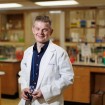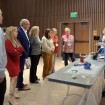UK's Brandon Fornwalt on Pediatric Heart Disease
Brandon Fornwalt, assistant professor of pediatrics, physiology and biomedical engineering in the Division of Pediatric Cardiology at the University of Kentucky, has been selected to receive the National Institutes of Health (NIH) Director's Early Independence Award. The award provides funding for junior scientists who have demonstrated outstanding scientific creativity, intellectual maturity, and leadership skills with the opportunity to conduct independent biomedical or behavioral research by skipping the traditional postdoctoral training period.
Fornwalt was among 14 exceptional junior scientists who have completed doctoral degrees or clinical residencies in the past year and have been chosen to be supported by the NIH Common Fund and contributing NIH Institutes. NIH plans to commit approximately $25.9 million to support their research projects over a five-year period. Fornwalt will receive $1.96 million over five years to advance his research in exploring the role of dyssynchrony – a condition where the heart suffers from uncoordinated contraction – in pediatric heart disease with magnetic resonance imaging (MRI).
"This is a great honor for Dr. Fornwalt, our pediatric cardiology program and the University of Kentucky," said Dr. Carmel Wallace, chair of the UK Department of Pediatrics. "His research background and proposals for future clinical advancements based on his research have made him a great asset that complements our pediatric cardiology team."
Originally from South Carolina, Fornwalt joined the faculty at UK in 2011 and directs the Cardiac Imaging Research Laboratory at Kentucky Children's Hospital. He attended the University of South Carolina receiving undergraduate degrees in mathematics and marine science. He worked in a free medical clinic for a year before starting a combined MD/PhD program at Emory University and the Georgia Institute of Technology in Atlanta. After finishing his degrees in 2010, he completed an internship in pediatrics at Boston Children’s Hospital.
"I have always had an interest in math, engineering and medicine but my true passion is research," Fornwalt said. "It is rare for someone to have that combination as their background but for me it was a natural fit. As imaging becomes an even more valuable and utilized tool in patient care and diagnosis, I think having people with math and engineering knowledge in the medical field will become more essential and more common."
Today, Fornwalt is among a growing number of translational scientists whose expertise in research and medicine bridges the gap taking innovations from the lab to the patient setting producing rapid clinical advances.
His research focus is in congenital heart disease -- or heart defects at birth -- which affects more than a million children and adults in the United States and is responsible for more years of life lost than all of childhood cancer combined. According to Fornwalt, "the big-picture goal of my research program is to address this problem by adapting a relatively new, highly successful therapy for adult heart failure called cardiac resynchronization therapy, into a treatment option for patients with congenital heart disease."
The most critical knowledge gap is identifying which patients with congenital heart disease are most likely to benefit from cardiac resynchronization therapy, he said. He is using MRIs to address this challenge by studying a population of patients with a common, serious congenital heart defect known as tetralogy of Fallot.
In the future, he plans to use this work as the basis for initiating randomized trials to study the effectiveness of cardiac resynchronization therapy in patients with congenital heart disease.
"We are extremely fortunate to have been able to recruit Dr. Fornwalt to UK," said Dr. Lou Bezold, medical director at Kentucky Children's Hospital and co-chair of the Kentucky Children's Hospital Congenital Heart Program. "He has a very bright future and I am confident he will continue to contribute to innovative and collaborative research here in the future."
Fornwalt is the first faculty member from Kentucky selected to receive the NIH Director’s Early Independence Award and as a recipient joins scientists from such elite research institutions as Yale University, UCLA, Stanford University, Brigham and Women’s Hospital in Boston, and the University of Pennsylvania. In addition, last year's cohort of awardees included five of the "30 under 30" in Science and Innovation named by Forbes Magazine.




